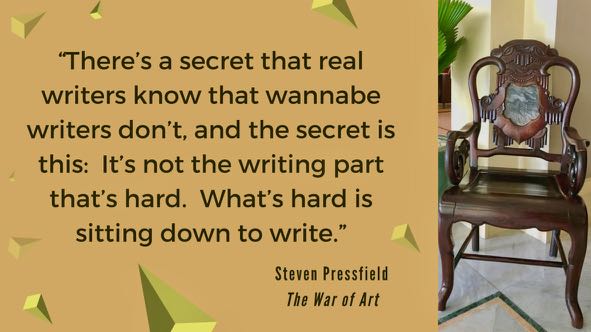
I’ve seen the topic of productivity a lot lately, maybe because we’re still in what’s considered the beginning of the new year and we’re all scrambling to keep up with New Year’s resolutions and tackle the goals we’ve set for ourselves. I haven’t specifically written about productivity, though I did write a blog post about writer’s block, which is akin to the weird uncle of the family when we talk about writing productivity.
I guess by now it’s a running joke that the hardest thing a writer can do is sit down and write. Butt in chair. Carving out that time. But I have never, in these six years I’ve been a part of the industry, understood this. I get writing is hard, and I’ve come to learn this about myself while writing and/or editing–If I hit a rough patch in dialogue, or say I’m echoing a word in a sentence and I want to rewrite the sentence to take out one of the words and I’m at a loss as to how to do it, instead of pushing through, I’ll flip over to Twitter. That’s avoidance. For now, I let myself do it because so far it hasn’t hampered my output. Normally, after I scroll for a second and see the same old drivel, I’ll flip back to my manuscript and keep going, but it can interrupt my flow.
I’ve seen a lot of tweets about productivity or lack thereof, and, unfortunately, if you’re writing to publish, and more importantly, if you’re writing to publish to build an author career, you kinda need it.
One of the hardest lessons you’ll ever learn in this industry is you don’t have nothing if you don’t have a book, and over time, you need several if you want to find any traction. If you’re writing a series, you have way more marketing power behind you if your series is done. You can’t accomplish that if you’re not writing.
What are some causes of lack of productivity? Here’s a short, though not comprehensive list, of what I’ve seen out in the writing community:
You’d rather do something else. This actually tells me a lot about how you feel about writing and publishing, and if you truly would rather watch TV, read a book, go for a drive, or make dinner, then honestly think about stepping back. Of course, it would help to know the reasons why you’d rather do something else. Maybe you’re not seeing the results you want, or you’ve lost interest. You started writing as a hobby and you’d rather pick up a different hobby like crocheting or knitting, or get back into exercise. If you’d choose to go to the dentist over sitting down and writing the next chapter, give yourself permission to stop writing. No one is forcing you, and if you hate what you’re writing, chances are, your readers will be able to feel that when they read your book. Move on. It’s okay.
You don’t like what you’re writing. Starting a new project is okay as long as you can finish something. If you lose interest in your WIP at the halfway point every time, something else is going on with more than just productivity. Maybe it’s a craft issue because you get bogged down in the saggy middle. Maybe finding an alpha reader who will read as you write, or a critique partner can help you stay motivated and give you tips and ideas on how to finish. The problem with learning craft is that you have to write to learn it. This is the same for characters, too. If you hate your characters, you have to figure out why. Is she a whiny snot? Doesn’t act her age? Is he an alphahole without any redeeming qualities? Are they not doing anything interesting? Find some feedback from somewhere, or refresh your creative well and read for a while. Start a new project, sure, but if you’re going to add to the 20+ WIPs you already have on your computer, you need to do some digging and figure out what the problem is and how you can fix it.
You have no idea what to do with it once you’re done. I’m reading Zoe York’s Romance Your Goals, and in it, of course she talks a lot about setting goals–setting realistic goals, and goals you have to work to reach. I have a lot of thoughts about goals, productivity, and strategies and tactics that will help you achieve those goals. If you have 10 finished books on your computer, they won’t do anything if you don’t know what you need to do with them. More than covering them with a good cover, writing a good blurb, and putting it up on Amazon. I mean, do you have a newsletter? Do you know an ads platform well enough you won’t lose money? Do you have a launch plan for what you’re going to do when your book is done? If you don’t, that could be causing you some productivity issues. If you have no idea what you’re going to do with it once your book is finished, there’s no real reason to finish it then, is there? That way of thinking was pretty much me for the past two years, but instead of lack of productivity, I think I had too much. That is a problem in itself because now I have lots of books and still no real actionable plan to maximize those books and pay myself for all the time it took me to write them.
Maybe you have an idea, but it’s too overwhelming to think about. We talk a lot about a five year plan, and sometimes it’s difficult to figure out what we’re eating for dinner in five hours, never mind where we want our careers to be in five years. If that look into the future terrifies you, ask yourself why. Writing and publishing is a long game, but if that look into the future bogs you down, shorten the timeframe. Maybe look to the next two years, plan out the books you want to write, be it three a year, two a year, whatever you can handle, and let yourself get excited about what’s coming in the immediate future.
You’re burnt out. I think I’ve mentioned this a lot on here, when I heard Jo Lallo say on the Six Figure Authors podcast that there is no faster way to get burnt out than when you work hard for little to no pay off. I’ve you’ve been working for a months, maybe years, and your career is in the same place as it was before, that can affect your productivity. You might wonder why you’re still trying to make a go of it, and you’re thinking about giving up. This conversation goes back to goals–what you want out of your writing and more importantly, how you’re going to get it.
You don’t have any writing friends to cheer you on or commiserate your failures. You’ve probably heard me mention this a time or two. A lot of my friends I made when I first joined the writing community are gone. They dropped off because they don’t write anymore, or we don’t talk for some reason or other. I was friends with a woman for a long time until I realized our friendship was all about her, and her writing, and her roadblocks, and whenever I would say something positive about me, or my books, she blatantly ignored it. I faded off from that friendship and a couple others. While I don’t recommend staying in a friendship (or any type of relationship!) that takes more than it gives, replace those friends with other people or you’ll look up from your laptop one day and see that you are alone. It’s tough to write and be proud of your successes if there is no one to share them with. Take that opportunity to reach out to other authors in your genre and make connections and friends there. Those relationships will be more meaningful because they’ll understand the ups and downs of writing and publishing in that genre. There are so many sprinting groups and people who are willing to be accountability partners. You’ll be surprised at how much better you feel if you have people to reach out to when you want to share your goals and small successes.
At the core of productivity is passion. You have to have passion for what you do, and joy and the love of writing will keep you coming back to your laptop and your characters. Sometimes other things will get in the way, but ultimately, if writing matters to you, you’ll find a way to keep going.
Good luck!



Thank you so much for sharing your thought so often, Vania. Your posts really help me as I continue writing.
LikeLiked by 1 person
Thank you! And I’m sorry it took so long to reply. Things in my life have definitely been crazy, but hopefully things will slow down as summer approaches! I hope you’re doing well!
LikeLike
Seems like you’re walking around in my head when you write these posts! 😀
LikeLiked by 1 person
It just proves that we all have the same troubles and we’re not alone! I hope I was helpful!
LikeLiked by 1 person
Your blog posts are always helpful! 🙂
LikeLike
Great article! Thanks so much for posting.
LikeLiked by 1 person
Thank you so much! Thanks for reading and commenting. I’m glad you got something out of it! 🙂
LikeLike